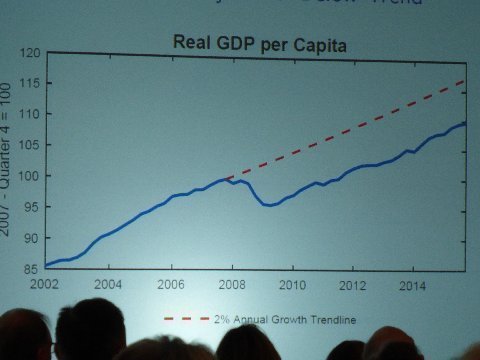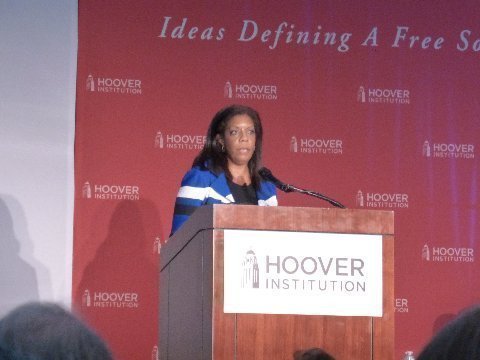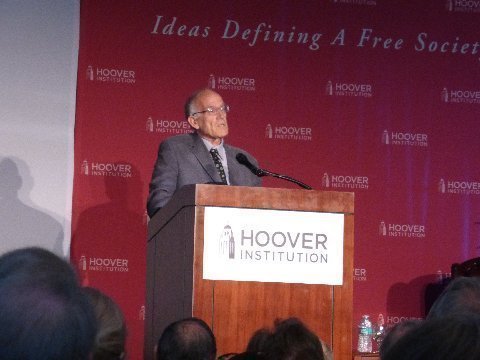Picto Diary - 19 April 2016 - Speaker Notes - Hoover Spring Retreat
Note: The note taker is fallible. Mistakes are his.

Above: William F. Buckley and Barry Goldwater. Scene from "Firing Line."
Presentation by Eric Wakin, Deputy Director of Hoover Institution library and archives. Hoover Institution Spring Retreat, Stanford University, 19 April 2016.
This month the Hoover Institution Library and Archives unveiled an exhibition that explores the history of one of the twentieth century's longest-running political talk shows, Firing Line, and the distinguished career of the show's host, William F. Buckley Jr.
The Hoover Institution holds an extensive collection of tapes, correspondence, and other materials relating to William F. Buckley's long-running talk show. With 1,505 installments over thirty-three years, Firing Line remains the longest-running public affairs show with a single host.
William F. Buckley Jr. was known for his accomplished powers in debate, his quick wit, and notably, his use of long, arcane words that often flummoxed guests on his show. For thirty-three years, he literally and figuratively darted his tongue at presidential hopefuls, political activists, religious leaders, artists, and ideologists. Buckley had the unique power to dismantle his adversaries' arguments not by derision or emphatic disagreement but by exploiting the internal contradictions in what his opponent had said or written - and in doing so he used words such as periphrastic, tergiversation and eristic.
Excerpt: In a May 1968 broadcast, Beat poet Allen Ginsberg tries to explain the counterculture to Buckley: "What is called the hippie movement involves an alteration of consciousness toward some greater awareness and greater individuality - which you might even sympathize with. Hopefully, the future will see, like, a spread of that gentleness and consideration coming through politically, and artistically, and maybe even on television." Buckley remarks, with a smile, "Not quite yet."

Above: Lee Ohanian, senior fellow at Hoover and professor of economics at UCLA, speaks to Hoover Institution Spring Retreat attendees. Stanford University. 19 April 2016.
Two charts (scroll) presented by Ohanian, one showing trend of real GDP per capita, the other showing trend employment per working age population, highlight the American economy's current ails. Both trend lines coincide with the country's first ever failure to recapture a post recession 3% growth rate.



Above: Herbert Lin, research fellow at the Hoover Institution, and senior research scholar for cyber policy and security at Stanford's Center for International Security and Cooperation. Speaker to Hoover Institution Spring Retreat. Stanford, University, 19 April 2016.
Topic: Punching Back in Cyberspace - The Use of Offensive Cyber Operations as Instruments of U.S. National Policy.
Topical Lin article about the issue of "punch back" as a viable solution to hacking of government computers:
CYBERSECURITY
US Government Hack-Back and the Computer Fraud and Abuse Act
By Herb Lin Wednesday, October 21, 2015, 12:32 PM
Robert Dietz has an op-ed in the Washington Times today in which he argues that the US Government needs the legal authority to “hack back” to attribute the party responsible for a cyberattack against the United States.
The op-ed cites the Computer Fraud and Abuse Act as one of the legal impediments to such action. Dietz writes:
Under various U.S. laws — no surprise — it is felonious to hack into domestic computer systems. Among others is the Computer Fraud and Abuse Act (10 U.S.C. 1030). The problem is that laws prohibiting hacking apply to government officials defending the nation’s computer systems as well as to private citizens bent on mischief.
But curiously, his piece is silent on the following clause in the CFAA – 18 USC 1030(f):
(f) This section does not prohibit any lawfully authorized investigative, protective, or intelligence activity of a law enforcement agency of the United States, a State, or a political subdivision of a State, or of an intelligence agency of the United States.
Dietz, a former general counsel for the National Security Agency, is surely aware of this clause, which on the face of it would seem to *allow* US intelligence agencies to conduct a lawfully authorized investigative activity that might otherwise violate the Computer Fraud and Abuse Act.
So what am I missing? Doesn’t existing law allow for just the kind of hackback that Dietz advocates?
Topics: Cybersecurity
Tags: Cybersecurity, Computer Fraud and Abuse Act

Above: Kiron Skinner, Hoover Institution Research Fellow and Director of the Institute for Politics and Strategy at Carnegie Mellon University, speaks to attendees at Spring Retreat, Hoover Institution. Stanford University. 19 April 2016.
Topic: The Problem of Global Power
Intro...
My friend Martin Anderson said, "99% of getting elected is the candidate himself."
Presidential candidates are more like each other than they are like anyone else.
The 2016 presidential election occurs in a political environment closer to that of the Civil War than any other election since.
Global Power Shift...
Under Obama US defense expenditures 3.6% of GDP.... historically, 4.0%. Washington has been in a defense cut driven strategy mode.
Saudi Arabia is 10.7% and Israel is 5.6% Most European/NATO nations are neighborhood 2% and trending downward.
Most of the growth in defense spending today comes from the global south... Global balance of power is shifting to south and east. No one is explaining why this is important.
Russia/China ability to tap into defense technology, long a US advantage, is becoming a game changer.
US is facing a growing Russia/China detente.
Growing regional defense structures.... Shanghai Cooperation Organization (SCO)... as counter to NATO. China and Russia want a multi-polar world sans US as a world leader. Interestingly, the current White House seems to think in similar fashion. DC stands by as the south/east power access builds and looks the other way.
One quarter of the world is dependent on US alliances. NATO has 28 members. NATO won't work if the US reduces its commitments.
Countries like Philippines and Japan are currently dependent on US treaty obligations. They can't do it alone. Current US policy is that US carries too much of the burden. US pressures many allies to carry more of the financial burden, as measured by defense expenditures as percent of GDP, for defense.
Why the global power shift?...
Why is there a challenge to global power? Has to do with us.
There is a growing sentiment on the part of much of America's foreign policy elite that a more diverse, less US centered political system will work better than one where the US acts as world policeman. Wars will end, so this view goes, when the US pulls its troops out of world hot spots. Asia, so this view says, is the future. Obama has pledged to avoid "quagmires" that have burdened US defense for the last several decades. Even some Republicans are starting to go along with this world view.
Western Culture is "out." Social justice is "in."
How can you defend the west against the onslaught of the more totalitarian south when, in the west, you don't know what you have... what you stand for?
Autocrats stay in power longer than elected leaders in democracies.
We don't spend enough time studying the west and the special values... natural rights... natural law... that have rendered more economic growth and individual freedom than ever achieved in the world.
Western policy makers don't know what they don't know.
US history is rarely taught in colleges today... Rather, students are instructed in gender studies, cultural studies and the labor movement.
The new power arrangements in the world are occurring because the "US is going loopy." There is no consensus or general understanding in the US... and more broadly the west... as just what is worth defending.
There is little study of military history going on in universities today. Hoover's Victor Davis Hanson should come out an teach at Carnegie! There is a widening distance between American civilians and the American military.
Conclusion..
The west is a project. If we don't defend it, we don't have anything. Its about us as a people... our values... and our willingness to stand for them.
There is a path forward. We must grab back our educational system and start teaching those values that have made us prosperous and free.

Above: Victor Davis Hansen, Senior Fellow Hoover Institution and professor of classics emeritus at Cal State Fresno, speaks to attendees of Hoover Institution Spring Retreat, Stanford, University. 19 April 2016.
Topic: Trump, Class, and the 2016 Campaign
How did Trump come about?
This should be a banner year for the Republicans.
HRC cannot champion anything "accomplished" by the Obama administration. She has nothing to run on.
Obama does better when we recedes from public view.
So... how do the Republicans get a populist candidate leading the Republican field of presidential hopefuls?
Three reasons:
1. Obama - Hypocrisy on all fronts. Has assaulted the constitution, promised transparency (not), presided over an anemic economic recovery, and been plagued with a cornucopia of scandals: IRS, Veterans Administration etc.
2. Republicans - Obtained the house in 2010 and the Senate in 2014... Campaigned that they would stop Obama's destructiveness... but, are perceived by an angry electorate to have done nothing. People are genuinely angry with the establishment.
3. Republican candidates - Rick Perry... boring, Christie... obnoxious. Kasich... a scold. Etc.
Trump's Clever Campaign
Don't deprecate Trump's skills. Who would have thought he could pull it off?
Look at the people he attacked. In all cases his attacks brought about controversial media coverage that would have destroyed a conventional politician.
1. John McCain - "Hero's," said Trump, "don't get captured." But, then people rallied to Trump's defense, contrasting McCain's capture with the "true heroism" of George Patten and others.
2. Megyn Kelly - We know what Trump meant. How did he survive this one? But, then, people realized that Kelly "wanted it both ways." It was widely perceived that Kelly was not altogether without fault in the exchange.
3. Jorge Ramos - He his happily married. He fled Mexico when threatened by the drug cartel, became a dual citizen, went to prep school. Surely, Trump's calumny would hurt him for his remarks against this stalwart immigrant? But, no. People realized that Ramos' immigration arguments are pro-multiculturalism and anti-assimilation. He came across as anti-American to many, despite having all the advantages of an American education.
Trump was no dummy in targeting for criticism the above three individuals, all darlings of the media and the establishment. He knew there would be an initial negative reaction to his remarks. He also knew there would be a backlash that would bolster, or at least neutralize, his position. Moreover, he knew he would be number one in the news cycle throughout the controversies. Trump, unlike other Republican candidates, shows a canny sense of the American zeitgeist today. And, he plays that, cleverly, to the hilt. You have to give him credit.
Trump's Campaign Strategy
He doesn't prep for speeches and appearances
He has no issue briefings or issue books prepared.
He has no handlers.
"Nah... I never prepare," he says
That's why he's so frustrating. He can rile a crowd, but he offers no apparent solutions to complex problems.
Examples:
1. Wall. Mexico will pay for the wall, he says. Clearly, that is an unworkable solution. He could have given a more sophisticated answer for this. For example, why not charge a "sin tax" on all outward remittances to Mexico? Proceeds from tax collections could pay for the wall.
2. NATO - People are going to fight and die for Estonia? he says. That's it? There are some legitimate criticisms to be made about NATO. European NATO members pay 2% of GDP or less for defense. Clearly, an intelligent case can be made to push strengthened European financial commitment to defense. Why didn't Trump take this tack?
3. Curtailment of Muslim immigration - His words "slow/stop Muslim immigration" were highly criticized. He could have said something along the lines of, considering the problems in the middle east we are going to review the situation with each country and make an immigration decision on a country by country basis. No mention of Muslims.
Trump (by design?) doesn't have a sophisticated way of engaging in foreign policy debate. Rather, he launches controversial bombs. But, this language resonates with a large segment of the population who feel they have been ignored by the establishment politicians.
Thinking Trump won't shoot from the hip is like thinking a tiger is a vegetarian. Carrying on the cat analogy, "a leopard doesn't change its spots."
Trump and Putin
Obama contrasts with Putin in the worst possible way.
Obama speaks loudly and carries a small stick.
Putin, to the chagrin of Trump's supporters, now pesters the United States with insouciance.
Trump knows Putin is a thug, but, he sees much to admire in Putin. Trump sees Putin looking after the best interests of Russia.
Next nine months will be scary. Obama can be rolled. We are at a very dangerous period in our relationship with Russia because of Obama's weakness.
Conclusion
The choice facing the American electorate may well be, "the bad is better than the worse."